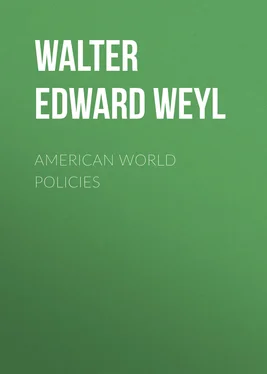Walter Edward Weyl - American World Policies
Здесь есть возможность читать онлайн «Walter Edward Weyl - American World Policies» — ознакомительный отрывок электронной книги совершенно бесплатно, а после прочтения отрывка купить полную версию. В некоторых случаях можно слушать аудио, скачать через торрент в формате fb2 и присутствует краткое содержание. Жанр: foreign_antique, Политика, Юриспруденция, на английском языке. Описание произведения, (предисловие) а так же отзывы посетителей доступны на портале библиотеки ЛибКат.
- Название:American World Policies
- Автор:
- Жанр:
- Год:неизвестен
- ISBN:нет данных
- Рейтинг книги:5 / 5. Голосов: 1
-
Избранное:Добавить в избранное
- Отзывы:
-
Ваша оценка:
- 100
- 1
- 2
- 3
- 4
- 5
American World Policies: краткое содержание, описание и аннотация
Предлагаем к чтению аннотацию, описание, краткое содержание или предисловие (зависит от того, что написал сам автор книги «American World Policies»). Если вы не нашли необходимую информацию о книге — напишите в комментариях, мы постараемся отыскать её.
American World Policies — читать онлайн ознакомительный отрывок
Ниже представлен текст книги, разбитый по страницам. Система сохранения места последней прочитанной страницы, позволяет с удобством читать онлайн бесплатно книгу «American World Policies», без необходимости каждый раз заново искать на чём Вы остановились. Поставьте закладку, и сможете в любой момент перейти на страницу, на которой закончили чтение.
Интервал:
Закладка:
Perhaps it will be objected that an analysis of war such as this leaves us merely with the dead body of facts while killing the soul of truth. Surely, it may be urged, war is more than a sordid calculation; a Roland or Bayard does not weigh his danger against booty. Of course that is so. Economic motive is only the skeleton of war; the flesh and skin are of a totally different texture. Idealism, nobility, heroism exist in war, and are no less sincere because based upon the gross facts of economic necessity and desire. Without such idealism, manufactured or evolved, you can no more win wars, especially in these latter days, than without ammunition. Idealism is a weapon with which we kill our enemies. Yet if we read our history rightly, we shall find less of this luminous nobility among warriors than our annalists pretend. The Greeks of the Trojan War were not patriots but free-booters. Those great English sailors, Drake, Morgan and the rest, who ravaged the Caribbean and smashed the Spanish sea-power, were pirates, unashamed of their piracy. As for the heroic warriors of the Scotch border, would they not to-day be jailed as cattle-thieves? Look where you will, at the great wars and at the blood-tracked colonising movements of history, and always you will find two kinds of men: the stone-blind idealist, and the crass, open-eyed, fleshly man. One fights for ideals, the other for something else worth fighting for. Both, however, are in reality impelled by economic motive, working upon them either directly and consciously, or transmuted into ideals through the medium of a people's thought.
Nor does this fighting for things, to be obtained only by fighting, involve moral turpitude. Nothing could be more grotesque than the moralistic tone in which we industrious moderns lecture the ancient fighting peoples. They did what we do, gained the things they wanted in the only way they could. Men will fight or work rather than starve, and whether they fight or work depends upon which, in the given circumstances, is the feasible mode of accumulation. Perhaps these peoples loved fighting and praised fighting more than we do. But as fighting was their métier and the measure of their success, their minds, like their muscles, became habituated, and their morality discovered virtue to be the thing at which the moralists were adept. Nothing can be wrong that is necessary to survival. Warfare is not immoral until there is an alternative.
Such an alternative might easily have arisen with the vast impetus given to accumulation by the discovery of America and of the new route to the East. But these events not only did not end but actually intensified war, while bringing out more sharply its preponderatingly economic character. For three generations Europe was enmeshed in the Italian wars, in which great rival nations sought to control Italian wealth and the dominion of the Mediterranean. There followed the so-called religious wars, in which Sweden played for control of the Baltic, Holland for the East Indian colonies, and England for trade supremacy, while Catholic France, to strengthen her position at the expense of Austria, came to the aid of Protestant Germany. For another century, from the Peace of Westphalia in 1648 to the Peace of Paris in 1763, there was a succession of commercial wars, in which England wrested from Holland and then from France the mastery of the sea as well as the control of Asia and America. During all this period the rising commercial classes of England were brutally "upon the make." Markets were gained in America and valuable commercial rights obtained from Portugal, while in the famous contract, known as the " Assiento ," English merchants secured from Spain the lucrative privilege of shipping one hundred and forty-four thousand negro slaves to the Spanish colonies of America. Of such was the texture of the complex European diplomacy that held the world in war.
In all these conflicts there was precious little idealism. The astute councillors of Elizabeth, of James, of Louis XIV, did not waste their august sovereign's time upon discourses concerning Britain's honour and the grandeur of France, but talked trade, privileges, monopolies, colonies to be exploited, money to be made. So too the Napoleonic Wars, those great conflicts between democracy and absolutism, reveal themselves as a continuation of the commercial wars of the eighteenth century. It was all the same process, the ranging of the nations, as formerly of tribes and of cities, for the conquest, first, of the means to live, and, second, of a preferred economic position in the world.
Such is the business of war, and it is the oldest business in the world. It is aided by patriotism, prejudice, uncharitableness and a whole calendar of ugly tribal virtues, which enjoin us to love the means by which we get and hate the men from whom we take. It is aided by racial scorn, a thing as deep as life, yet subject on the whole to that more impelling factor, economic motive. The history of war and peace is a history of the overriding of sentimental considerations by imperious economic needs. During the Revolutionary War, no love was lost between the rigid, race-conscious Englishman and the despised red-skin, yet both joined hands to scalp Americans in the lonely settlements along our frontier. To-day German and Turk, Italian and Russian, Frenchman and Senegambian, Briton and Japanese, love each other at least temporarily because pursuing like interests. Not that the influence of race and nationality upon those mutual repulsions which lead to war can be brushed aside in a paragraph. They are potent, modifying factors, with a certain independence of action, and serving, with regard to economic motives, as accelerators, intensifiers or, to change the illustrations, as containers. Yet it is no great exaggeration to say that no racial antagonism can wholly sunder allies joined by a vital economic bond, and no racial sympathy firmly unite nations who want one indivisible thing. The "Anglo-Saxon cousins" now live in concord, but not solely because they are Anglo-Saxons. As for religious differences, which have in the past so often exacerbated the war spirit, this influence is less than appears. Even the godly live on bread and butter. The Protestant princes of the Reformation hated the Scarlet Woman because of the Real Presence, but they also hated her because of the golden stream that flowed from Germany to Rome. The English Reformation had less to do with Mistress Anne Boleyn than with the wealth of the monasteries. Especially among modern industrial nations, with their increasing theological apathy, are religious differences of relatively small importance in determining wars. It is the economic motive which tells. 2 2 For a sketch of the economic influences bearing upon war, see the brilliant essay of Prof. Edward Van Dyke Robinson, "War and Economics in History and Theory," Political Science Quarterly , Vol. XV, pp. 581-622. Reproduced in "Sociology and Social Progress," compiled by Prof. Thomas Nixon Carver (1905), pp. 133-173. In the present chapter I have borrowed extensively from Professor Robinson's essay.
Considering all these facts of history, so hastily reviewed, considering that in practically all countries and at all times economic impulses have tended to push men into war, is the conclusion forced upon us that we shall have war so long as we have economic desires, and that in the future mankind will continue to drag itself along a blood-stained path? Can we change in human nature that desire for material things, which has always been the great survival virtue of the race?
To many men the answer points to perpetual war. They believe that nations will fight so long as they are hungry, and they will always be hungry. War and birth are the twin immortals; there will always be more babies than can be fed and there will always be war. As well preach against death as against war, since the peaceful, abstaining nations are doomed to extinction and the war-like nations survive and determine the character of humanity. The meek nations do not inherit the earth. They go down in the ceaseless struggle between the living and the dying peoples.
Читать дальшеИнтервал:
Закладка:
Похожие книги на «American World Policies»
Представляем Вашему вниманию похожие книги на «American World Policies» списком для выбора. Мы отобрали схожую по названию и смыслу литературу в надежде предоставить читателям больше вариантов отыскать новые, интересные, ещё непрочитанные произведения.
Обсуждение, отзывы о книге «American World Policies» и просто собственные мнения читателей. Оставьте ваши комментарии, напишите, что Вы думаете о произведении, его смысле или главных героях. Укажите что конкретно понравилось, а что нет, и почему Вы так считаете.












